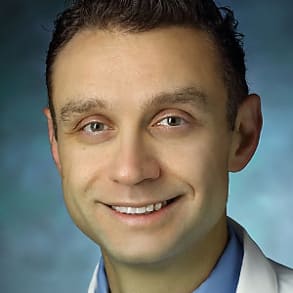Ahmad Marashly, medical director of the Pediatric Epilepsy Surgery Program, recaps his presentation on difficult discussions within the pediatric epilepsy clinic related to surgical treatments. During his talk at the 2023 American Epilepsy Society annual meeting, Marashly emphasized the importance of considering surgery as a treatment option, as for some epilepsy patients it offers the only chance for a cure. Click here to learn more about the Johns Hopkins Epilepsy Center .
Hello, my name is Doctor Ahmed Marashi. I am one of the epilepsy experts and the medical director of the pediatric epilepsy surgery program at the Johns Hopkins University. I talked about introducing the concept of epilepsy surgery into clinical practice in clinic during the recent annual American Sy Society meeting in Orlando Florida. The focus of my talk was about how to introduce such a difficult concept in circumstances that are challenging such as patients with epilepsy that arises from or eloquent cortex. Patients with multiple epilepsy or patients with multiple comorbidities. About one third of patients with epilepsy do not respond to anti seizure medications. Those are defined as the as patients who have failed two or more seizure medicines. In fact, such patients have less than a 4% chance of achieving seizure freedom overall, that is exactly what of surgery is indicated and can be extremely successful up to 50 or even 90% of patients depending on the pathology and the surgical intervention can achieve to your freedom. After a post surgery, research has also shown that early control of seizures can result in a much better cognitive outcome and a much better quality of life. Therefore, ep surgery should be considered as early as possible in patients with refractory epilepsy education, both on the part of the treating physician and the patients and the families is key to successful surgery evaluation and treatment. I hope that by watching that presentation, you would have learned something new that you can incorporate in your everyday clinical practice to care for patients with difficult to treat or refractory seizures to learn more. Please click on the link below. Thank you.



